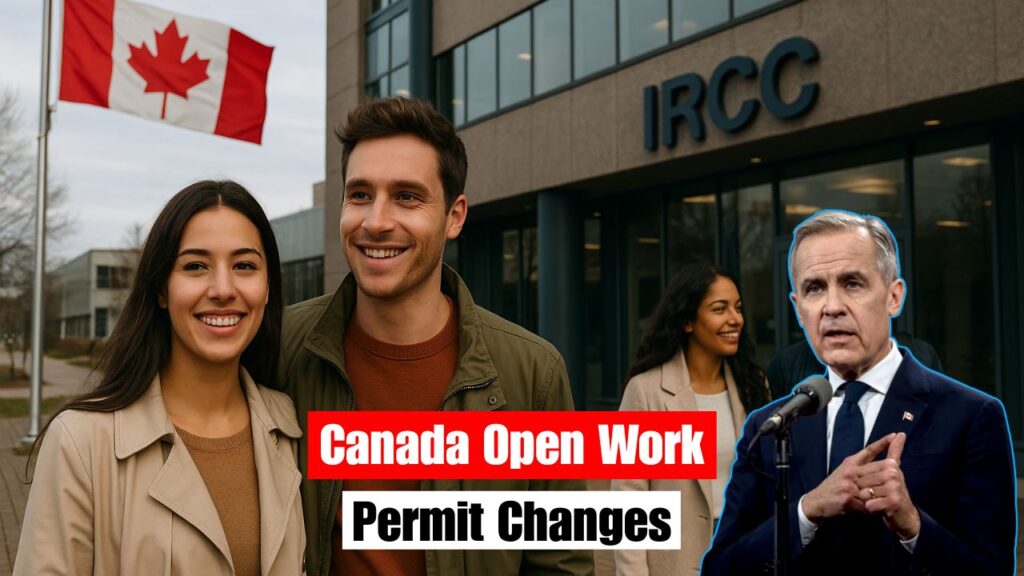Canada Work Permit Changes – Canada’s latest announcement on major Open Work Permit changes for 2025 has gained strong attention among newcomers, temporary residents, and international graduates hoping to shift toward long-term settlement options. With new IRCC rules taking effect from 29 November, the Canadian government aims to streamline work access pathways, create fairness among applicants, and ensure employers gain access to much-needed talent across key sectors. These updates influence application procedures, eligibility documents, dependents’ rights, and processing timelines, making it essential for workers and families to understand how the new rules impact their ability to work and stay in Canada.

Updated Open Work Permit Rules for Canadian Residents
The updated Open Work Permit rules introduced for Canadian residents are designed to simplify the labour market entry process for skilled individuals while maintaining system integrity. Under these new changes, IRCC has refined eligibility definitions for workers already living in Canada, especially those transitioning from study permits or employer-specific permits. The reforms also aim to reduce backlogs and create more predictable processing windows for applicants. These adjustments ensure that workers can contribute more effectively across Canada’s growing industries while receiving improved transparency in documentation requirements and timelines. As these rules come into force on 29 November, applicants are encouraged to review how the updated framework aligns with their long-term work and residency plans.
New Work Authorization Pathways for People Across Canada
The new work authorization pathways introduced across Canada aim to expand opportunities for temporary residents, dependents, and international graduates. IRCC has widened access to open permits for spouses of workers in high-demand sectors, strengthened post-graduation work eligibility rules, and introduced clearer conditions for maintaining valid status while transitioning between programs. The adjustments not only help individuals secure stable jobs but also provide employers with access to a diverse and skilled workforce. With these enhancements, Canada is reinforcing its commitment to supporting workers and their families while promoting labour mobility in a fair and balanced way.
| Category | New 2025 Rule |
|---|---|
| Primary Eligibility (Workers) | Clearer status definitions and documentation requirements |
| Spouses & Dependents | Expanded access to Open Work Permits under new IRCC pathways |
| International Graduates | Updated PGWP-related criteria with extended work transitions |
| Processing Times | More predictable timelines under 29 November reforms |
| Employer Impact | Simplified hiring process for sectors facing labour shortages |
Revised Permit Benefits for Individuals Living in Canada
The revised permit benefits for individuals living in Canada provide greater flexibility, especially for those seeking long-term professional stability. IRCC’s 2025 adjustments ensure that eligible workers can smoothly transition between jobs without jeopardizing their status, which is crucial in industries experiencing rapid hiring shifts. The reforms also offer extended validity periods for certain permit types, reducing administrative burdens for applicants and employers. These updates help individuals remain active participants in Canada’s workforce while gaining clarity on their rights, obligations, and future immigration pathways as they plan their careers.
Enhanced Application Support for Canadian Applicants
The enhanced application support introduced by IRCC offers Canadian applicants clearer guidelines, streamlined online forms, and additional instructions for those transitioning between permit categories. These improvements reduce confusion around required documents, biometrics, and proof-of-status submissions. With the new changes coming into effect on 29 November, applicants benefit from a more structured and user-friendly system, ensuring fewer delays and errors during submission. This additional support strengthens Canada’s commitment to transparency and efficiency, helping workers navigate the immigration process with confidence while maintaining legal compliance within the country.
Frequently Asked Questions (FAQs)
 Canada’s $500 One-Time Housing Benefit Announced — Payment Timeline and Eligibility Details Released
Canada’s $500 One-Time Housing Benefit Announced — Payment Timeline and Eligibility Details Released
1. When do the new Open Work Permit rules begin?
The new IRCC Open Work Permit rules officially take effect on 29 November 2025.
2. Do spouses benefit from the new IRCC changes?
Yes, many spouses and dependents gain expanded eligibility under the updated pathways.
3. Will international graduates be affected by the updates?
Yes, revised criteria for PGWP transitions are part of the new 2025 rules.
4. Are processing times expected to improve?
IRCC aims to provide more predictable and faster processing under the new reforms.



